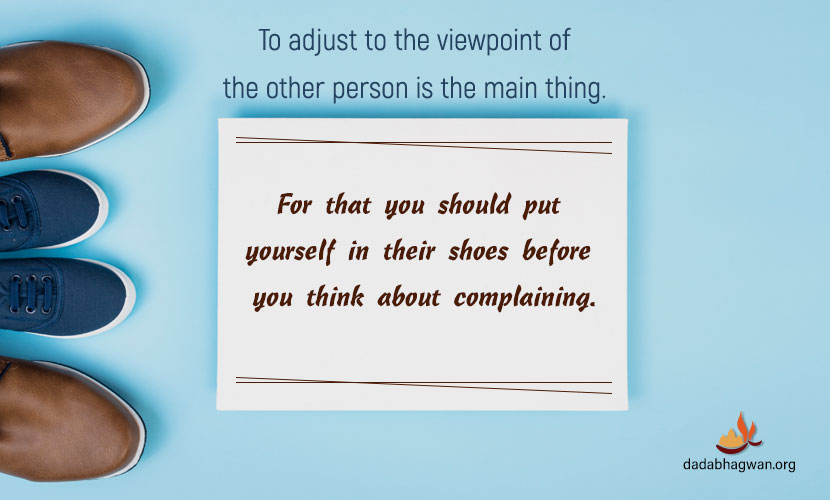What are the different ways to make adjustments?
Param Pujya Dada Bhagwan coined the phrase, ‘Adjust Everywhere’. He has outlined numerous ways on how you can make adjustments in life:

- To adjust to the viewpoint of the other person is the main thing. For that you should put yourself in their shoes before you think about complaining.
- Mold your dissatisfactions through the power of positive thinking, instead of complaining. One way to do this is to see convenience in inconvenience. Param Pujya Dadashri says, "One night I thought to myself, ‘This bed sheet is dirty,’ but then I made an adjustment that, ‘It feels so soft, you can’t even imagine!"
- You suffer because of your opinions of good and bad. You must keep them in check. When you say something is good, other things by comparison become bad and begin to bother you. If you rise above opinions, good or bad, there is no suffering. 'Adjust Everywhere.'
- Remember that all situations are transient and that they will ultimately depart. Indeed the situation will depart, while the damage done by the conflicts created in its wake will echo for a long time. Param Pujya Dadashri says, "Nonetheless, one should adjust in this world. This is because every single thing has an end. And even if it were to last for a long time, you are not helping it; you are harming it more. You are harming yourself, and the other person is also being harmed."
- Do not get caught up in trying to verify the 'truth'. The 'truth' is ultimately relative and depends on each person's point of view. Whatever people say, whether it is true or not, you should adjust. If someone tells you, “You have no sense,” you should adjust immediately by saying, "You are right. I was always a little slow. You just realized it today, whereas I have known about it from my childhood." If you respond like this, you will avoid conflict. They will never bother you again.
- Apply a counter-pulley. Param Pujya Dadashri asks us to consider the process of adjusting using the metaphor of a pulley system. If your mental revolutions (speed of thought) are at a speed of 1800 rpm and the other person’s revolutions are at 600 and you try to force your opinion on that person, their engine will break down and all the gears will have to be replaced. They will understand what you are saying only after you insert a counter-pulley and slow your revolutions down.
- If for instance you hurt someone because you did not adjust in a situation, then go back to them and apologize. This is another technique of adjusting to the situation without creating further conflict.
- Think about it, if you cannot handle being told about your mistakes, then how can you show other people their mistakes. Instead try to recognize the nature of the other person, this will enable you to understand the reason why they are behaving the way they are, therefore you will be able to adjust with them.
- Accept everyone the way they are, and do not try to change them. This becomes much more critical with family members. Param Pujya Dadashri says, "Someone may say, “Straighten her out.” Hey, if you try to straighten her out, then you will end up becoming crooked."
- It is best to accept your spouse and family members exactly as they are. It may also be helpful to think of your home as a garden, with different flowers (personalities). Param Pujya Dadashri says, "In one home, one is a rose, another is a jasmine; so the rose complains, ‘Why are you not like me? Look at how white you are, and look at how pretty my color is!’ So the jasmine will reply, ‘You are full of thorns.’ Now, if it is a rose, it will have thorns; if it is a jasmine, there will be no thorns. The jasmine flower will be white, and the rose will be pink or red." So appreciating the diversity of thoughts, opinions and personalities will reduce conflict.
- Making an adjustment does not mean that you blindly follow what other people are saying just to avoid conflict. You should sit and discuss what the problem is. Everyone can pose their viewpoint and solve the problem with mutual understanding in order to reach a solution without creating further conflict.
- Observe someone who knows how to adjust and learn from them.
Make adjustments in such a way that no one is put in difficulty because of you.
Newsletter signup
subscribe your email for our latest news and events





